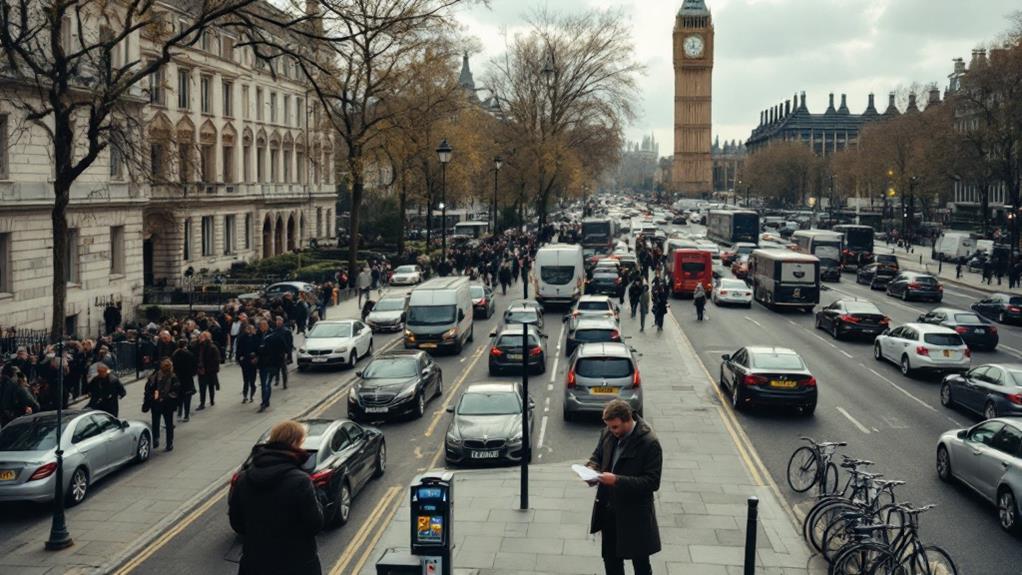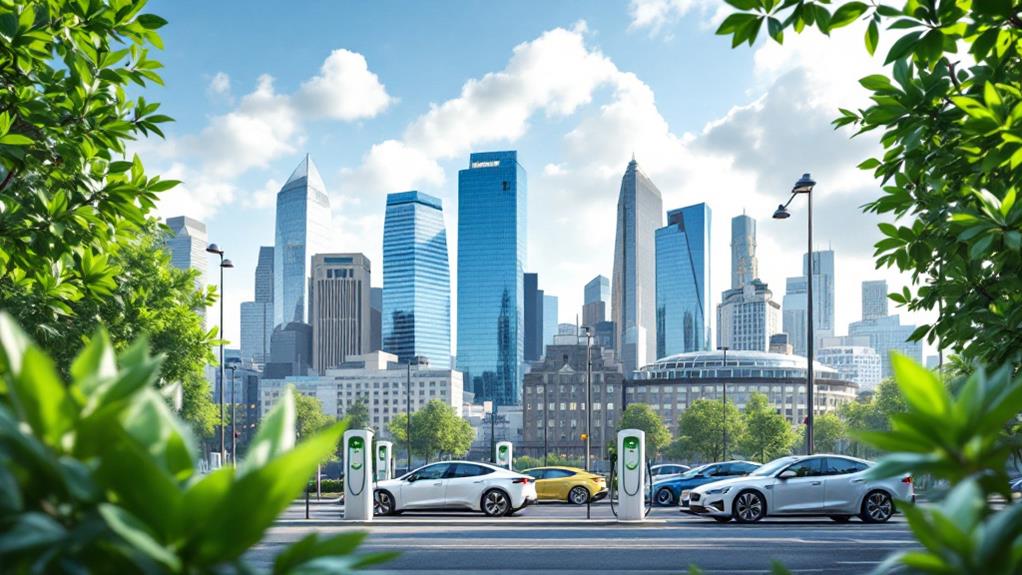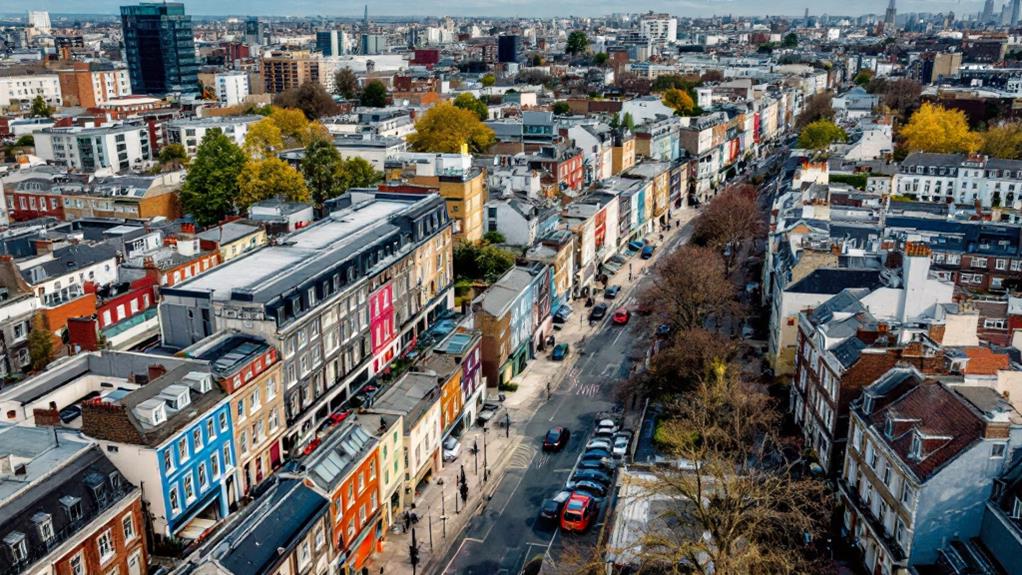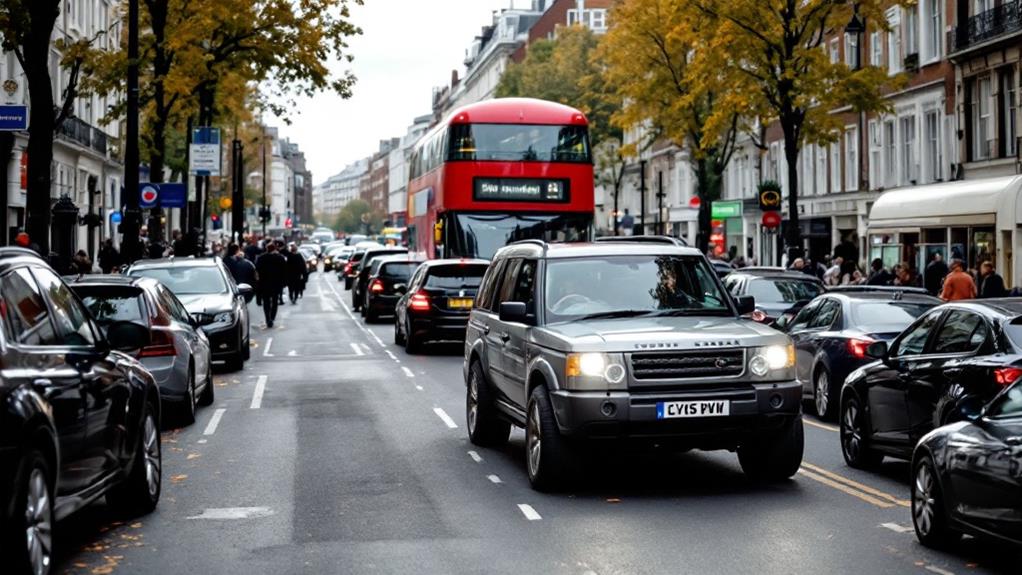The Pros and Cons of Residential Parking Permits in London
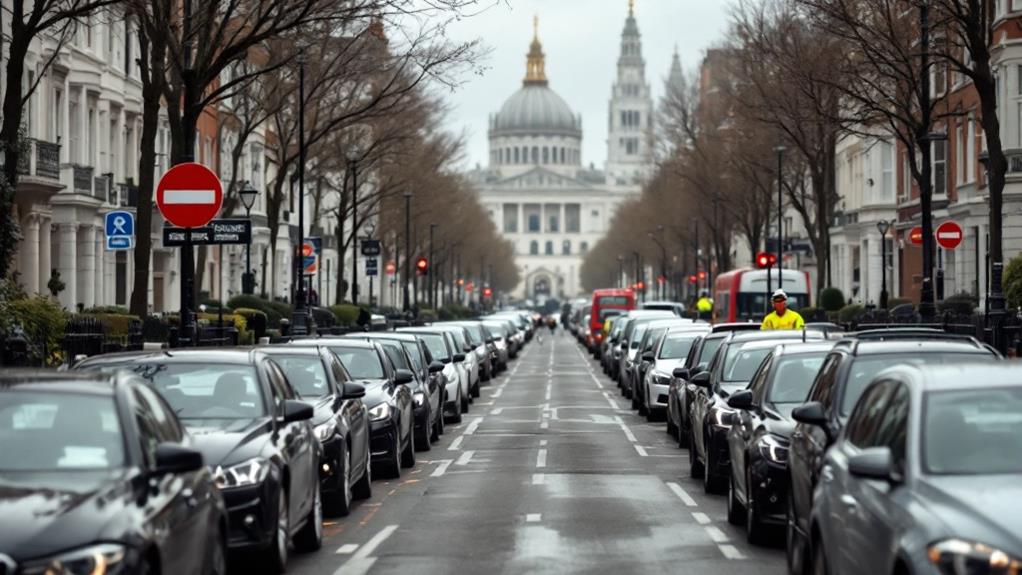
Residential parking permits in London offer you both advantages and drawbacks. You'll find it easier to park near your home and enjoy prioritized access to on-street spaces. The schemes can reduce congestion and improve road safety in your neighborhood. However, you might face increasing fees over time and potential overselling of permits. Visitors and businesses may struggle with restrictions, and enforcement can be inconsistent. Environmental benefits depend on scheme design and resident behavior. While permits aim to manage parking demand, they also present affordability concerns for some households. Evaluating these factors will help you understand the full impact of these schemes.
Understanding Residential Parking Permits
In recent years, residential parking permits have become a common sight in London's thriving neighborhoods. These permits are part of a resident parking scheme designed to manage on-street parking and prioritize spaces for local residents. When you live in an area with high parking demand, you'll find that residents permits can be a precious tool for securing parking near your home.
To obtain a permit, you'll typically pay annual parking charges. It is crucial to note that these permits don't guarantee a parking space but give you priority over non-residents. The scheme often includes time restrictions for non-permit holders, effectively managing parking demand throughout the day.
Your permit is linked to a specific vehicle and can't be used in different streets, even within the same scheme. This helps maintain fair parking management across neighborhoods. While on-street parking is the focus, some areas may also incorporate off-street parking options.
Benefits for Local Residents
Residents of London neighborhoods with parking permit schemes enjoy several key benefits. As a resident, you'll find it easier to park near your home, reducing the time and stress associated with searching for a spot. Resident parking schemes prioritize your access to on-street parking, ensuring you're not competing with non-residents for limited spaces.
You'll also notice a reduction in inconsiderate parking and fewer cars dominating your street. This can lead to improved road safety, as the formalized parking layout prevents vehicles from parking in unsuitable locations. The permit system makes it more convenient for your visitors, tradespeople, and delivery services to park when they need to access your property.
Moreover, resident parking schemes can create opportunities to enhance your neighborhood's infrastructure. With better-managed parking, there's potential to introduce street improvements like trees, benches, or bicycle storage. These additions can contribute to a more pleasant and livable environment. By participating in a parking permit program, you're not just securing a place to park; you're contributing to a more organized, safer, and potentially greener street for all residents to enjoy.
Challenges and Potential Drawbacks
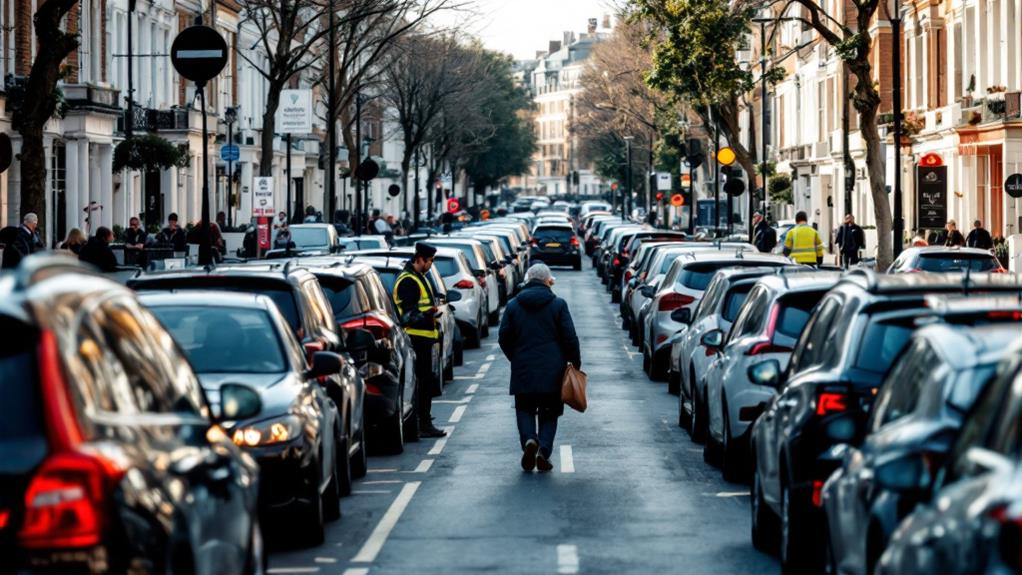
While residential parking permits offer numerous advantages, they're not without their challenges. You may find yourself struggling to park near your home despite having a permit, as some areas oversell permits beyond available spaces. This can lead to frustration and safety issues, especially on busy roads where visibility at junctions is important for road safety.
The cost of permits can be a concern, with parking fees increasing over time. You'll need to evaluate the financial impact of paying for a permit, particularly if you have additional cars. Enforcement of parking controls can be limited due to budget constraints, resulting in ongoing parking issues with illegal parking and commuter parking in residential areas.
Visitors and their visitors may face inconvenience due to restrictions, potentially affecting your social life. You might need to purchase visitors' permits or find alternative parking solutions when guests come over. Additionally, delays in implementing controlled parking zones by local councils can prolong existing parking problems in your area.
These challenges highlight the pros and cons of residential parking schemes, emphasizing the need for careful consideration when introducing parking controls in town centres and residential streets.
Impact on Businesses
Local shops and restaurants often feel the pinch when residential parking permits are introduced. You'll notice that these schemes can potentially decrease customer traffic by limiting non-resident access to park close to businesses. This can be particularly challenging for establishments without off-street parking options.
However, it's not all doom and gloom. Businesses can apply for dedicated permits to support their operations within controlled zones. Some permit systems even offer opportunities for shops to provide visitor passes or validation to customers, helping mitigate accessibility concerns.
The impact on your business will depend on various factors, including the scope of the permit scheme, enforcement practices, and the availability of alternative transportation options for customers. You might find that the use of alternative modes of transport increases among your clientele.
It's worth noting that concerns have been raised about these schemes unfairly discriminating against certain community groups, such as mosques, that rely heavily on visitors. While there are clear disadvantages of a resident parking system for businesses, it's crucial to consider available options and work with local authorities to find solutions that balance residents' needs with commercial interests.
Environmental Considerations
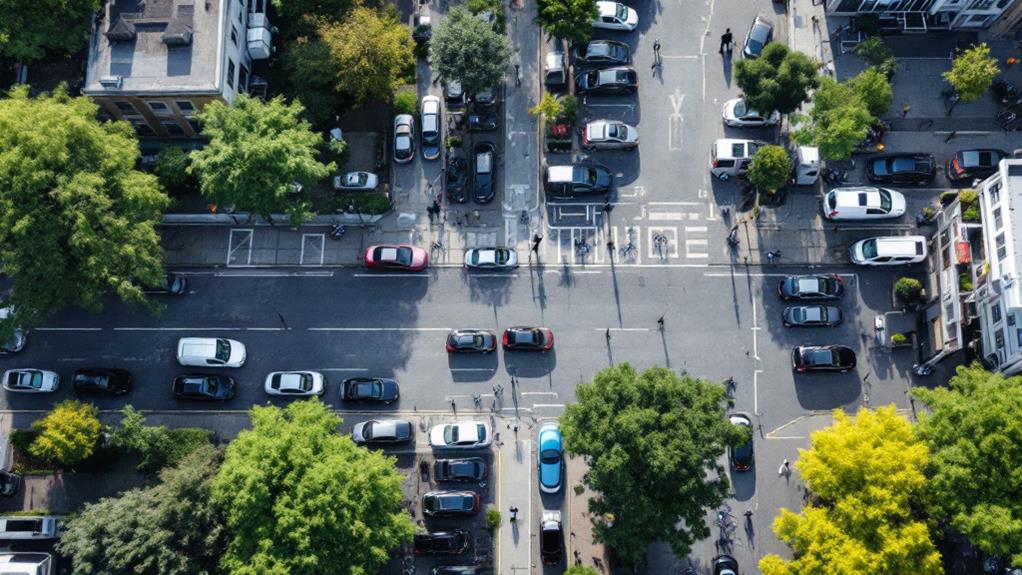
London's residential parking permit schemes have notable environmental implications. These programs can lead to emissions reduction and air quality improvements by decreasing congestion and unnecessary vehicle searches. However, the environmental benefits largely depend on scheme customization and resident behavior impacts.
Consider these key environmental aspects of residential parking permits:
- Space optimization: Formalizing parking layouts may result in fewer overall spaces, encouraging residents to reconsider car ownership.
- Transport mode shifts: With limited parking, you're more likely to opt for sustainable alternatives like walking, cycling, or public transit.
- Visibility enhancement: Fewer parked vehicles on streets can improve road safety by increasing visibility for pedestrians and drivers.
- Air quality improvements: Reduced congestion and vehicle movements can lead to lower emissions in residential areas.
While these schemes offer potential environmental benefits, it's important to recognize the environmental trade-offs. The success of these programs in achieving positive environmental outcomes relies heavily on thoughtful design and implementation. By carefully considering factors such as permit allocation, pricing, and integration with other sustainable transport initiatives, London can maximize the environmental benefits of residential parking permit schemes while minimizing potential drawbacks.
Implementation and Enforcement
Having considered the environmental aspects, it's important to understand how residential parking permit schemes are put into action and guaranteed in London. The implementation of these schemes involves a formal order process, which establishes marked parking bays in designated areas. Once in place, you'll find that enforcement isn't carried out by police or traffic wardens, but by civil enforcement officers.
It's worth noting that there are some limitations to the enforcement of these schemes. You may notice fewer restrictions during late nights or on Sundays, as it's often not financially viable to maintain officer enforcement requirements during these times. When it comes to using your permit, you'll need to be aware of single street permit restrictions. Your permit is only valid within the specific scheme on your property's frontage, even if there are multiple streets included in the scheme. However, you'll have the freedom to park anywhere within that controlled area parking allowance. This system ensures that residents have priority parking in their immediate vicinity while maintaining flexibility within their designated zone.
Cost Implications

When it comes to residential parking permits in London, the cost factor can't be overlooked. The financial burden on residents varies depending on the local authority and scheme details, with annual permit costs typically ranging from £40 to £100. While these fees are designed to cover administrative and enforcement costs rather than generate profit, affordability concerns remain, especially for those on limited incomes.
To manage permit expenses and ascertain equitable pricing structures, some local authorities have implemented cost-effective measures:
- Discounted permits for low-emission vehicles
- Reduced rates for residents on certain benefits
- Flexible visitor permits available for £1-£5 per day
- Permit cost subsidies for eligible households
Balancing costs and benefits is pivotal for the economic impact on households. While the expense can be significant, it is indispensable to ponder the advantages of improved parking availability and reduced congestion in residential areas. To address affordability concerns, residents can investigate options such as carpooling, using public transportation, or advocating for more flexible permit options. By working with local authorities to develop fair and accessible pricing structures, communities can help guarantee that residential parking permit schemes remain beneficial without imposing undue financial strain on residents.
Alternative Solutions
While residential parking permits offer one solution to urban parking challenges, they're not the only approach. You'll find a range of alternative solutions that can effectively address parking issues in London.
Improved public transportation and mobility hub integration can greatly reduce reliance on private vehicles. By implementing car-sharing schemes and promoting shared micromobility, you'll see a decrease in parking demand. Encouraging active travel modes like walking and cycling through proper land use planning can further alleviate parking pressures.
Pricing strategies and priority access systems can help manage parking more efficiently. You might also consider expanding off-street parking facilities, such as multi-story car parks, to accommodate non-resident demand. Neighborhood-based solutions and public-private partnerships can lead to innovative approaches customized to specific areas.
Zoning regulations and developer contributions can guarantee new residential developments provide adequate off-street parking. As you look to the future, consider the potential impact of autonomous vehicles on parking needs. By implementing a combination of these alternative solutions, you'll create a more inclusive and sustainable approach to urban parking management in London.
